Key takeaways:
- Systemic inequality reflects entrenched barriers affecting wealth, education, and health, shaped by historical injustices like colonialism and segregation.
- Reparations politics can address past wrongs by fostering community engagement and enabling marginalized voices to influence policy.
- Financial support from reparations can catalyze community revitalization, leading to emotional healing and redefined aspirations for residents.
- Strategies for advocating reparations include building coalitions, sharing personal narratives, and leveraging social media for wider engagement.
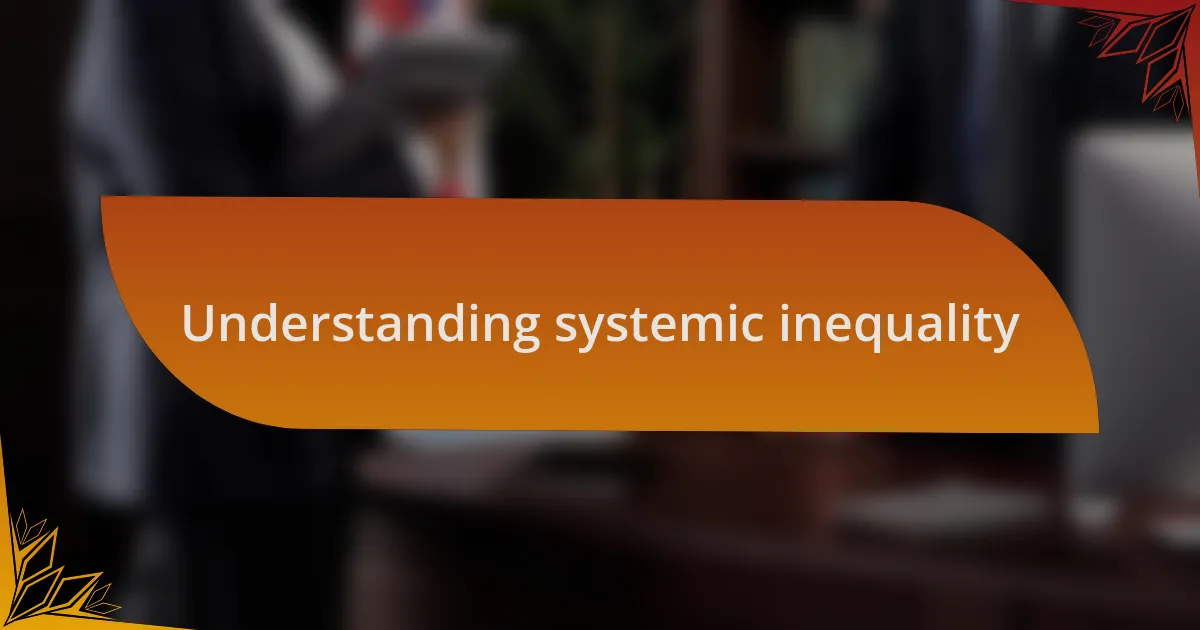
Understanding systemic inequality
Systemic inequality refers to the deeply entrenched barriers that perpetuate disparities across various aspects of life, such as wealth, education, and health care. I often reflect on how my own experiences have illuminated these often invisible structures. For instance, I once had a conversation with a friend who struggled to secure funds for higher education, not because of lack of merit but due to the lack of resources in their community.
It’s striking to think about how these disparities can arise from policies and practices that have persisted over generations. Have you ever noticed how certain neighborhoods receive higher investments in infrastructure and services? I remember driving through areas that are starkly different; the disparity in services can sometimes feel like a physical wall separating lives and opportunities, leaving me questioning the fairness of such an arrangement.
My own interactions with people from various socioeconomic backgrounds have underscored the reality of systemic injustice. I can vividly recall discussing the challenges my colleagues faced in their pursuit of advancement at work. They worked incredibly hard, yet systemic barriers seemed to overshadow their efforts. This made me realize that understanding systemic inequality requires looking beyond individual circumstances and examining the broader societal context.
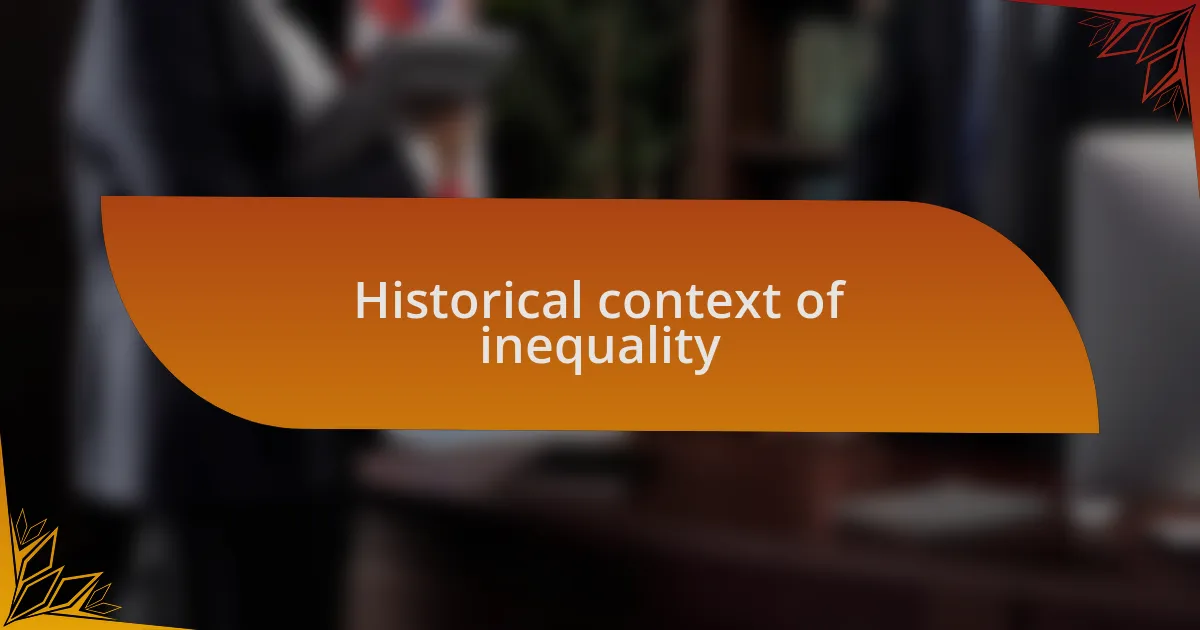
Historical context of inequality
The historical roots of inequality stretch back centuries, woven into the very fabric of our societies. I remember a history class where we dove into the impact of colonialism and slavery on economic systems, revealing how these practices created wealth for some while disenfranchising entire populations. Can you imagine the long-lasting effects of such exploitation? It’s a sobering reminder of how past injustices shape present realities.
When examining the origins of systemic inequality, I think about land ownership and access, which have often dictated wealth accumulation. In my own community, I’ve observed how families who inherited land benefit from equity that newer residents, often from marginalized backgrounds, simply cannot access. This reality made me ponder: how can these disparities be dismantled when the foundation of wealth has been built on exclusion?
Looking at policies like redlining and segregation, I see clear examples of intentional strategies that have perpetuated inequality. I recall my visit to a city divided by invisible lines, where one side boasted flourishing businesses while the other faced neglect. It begs the question: how can we reconcile the historical choices that continue to burden communities today? Understanding this context opens up crucial conversations about accountability and the urgent need for reparative actions.
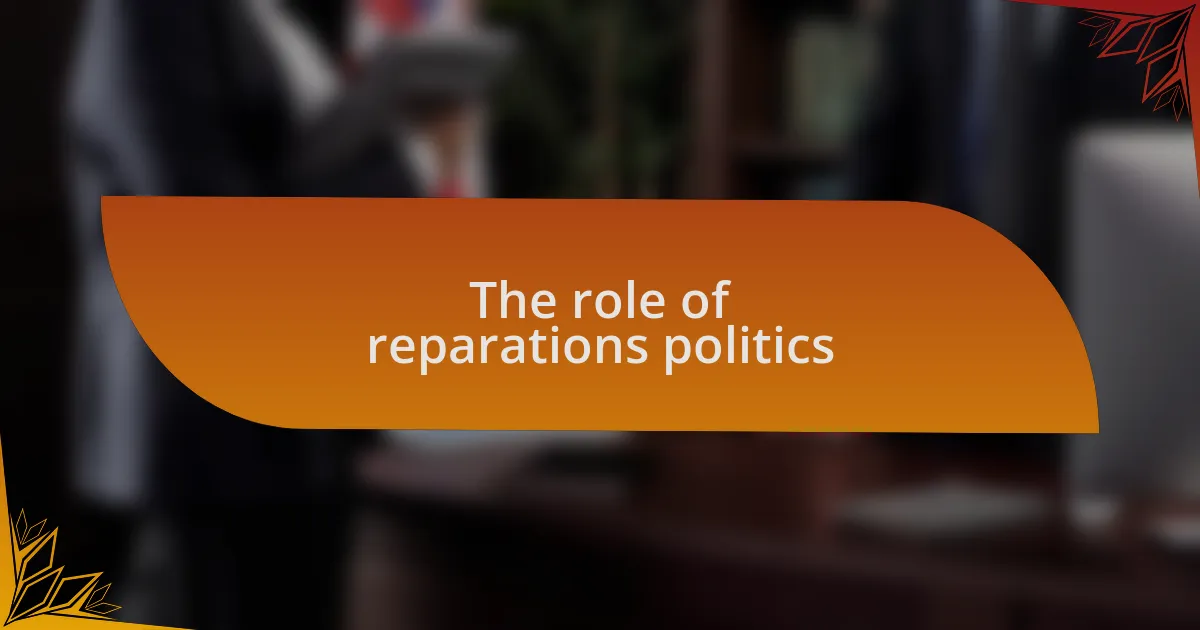
The role of reparations politics
Reparations politics serves as a powerful vehicle for addressing the injustices rooted in our society. I recall attending a community meeting where activists passionately discussed the importance of reparations, arguing that acknowledging the past can help heal deep wounds. It made me wonder: what would our communities look like if they had the resources and support to thrive, based on a fair acknowledgment of historical wrongs?
Moreover, engaging in reparations politics does not only focus on monetary compensation but also champions a broader recognition of rights and dignity for marginalized groups. I’ve seen firsthand how initiatives aimed at reparative justice have sparked conversations that bring communities together, helping people share their experiences and visions for the future. Isn’t it encouraging to think how reparations can unlock opportunities for shared growth and understanding?
As I delve deeper into this topic, I realize that reparations politics can also empower marginalized voices to shape policy and advocacy. Listening to those directly affected by systemic inequality is vital, as it fosters a sense of community ownership over the reparative process. It raises an important question: how can we elevate these stories to ensure they guide meaningful change and promote equity for generations to come?
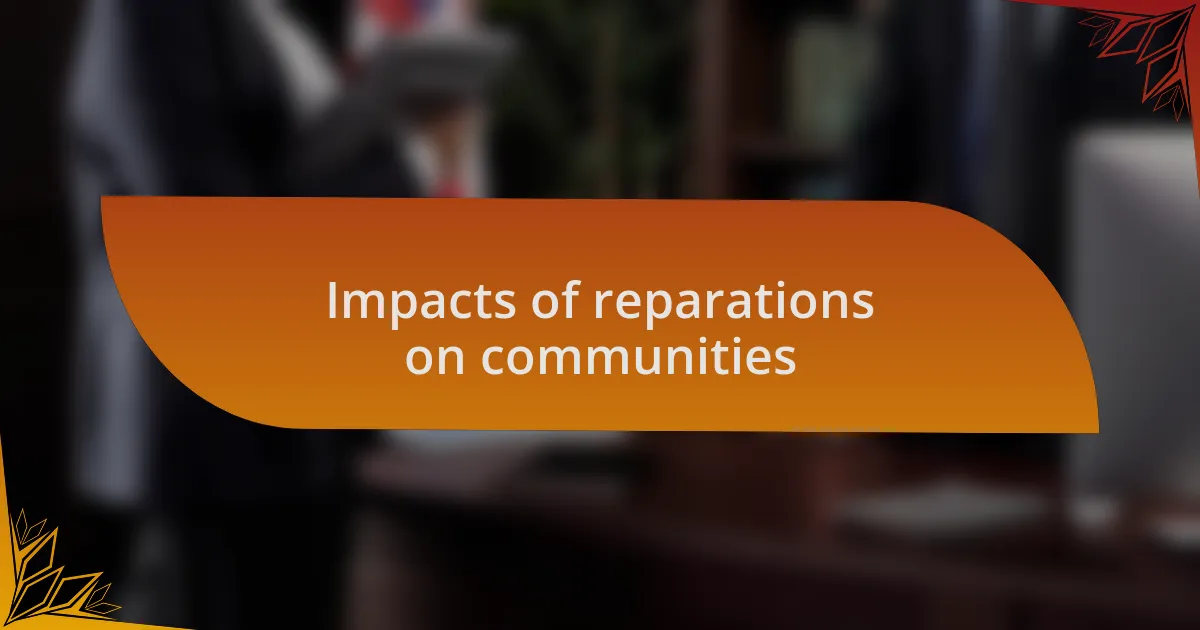
Impacts of reparations on communities
Engaging in reparations can fundamentally reshape communities by fostering a sense of belonging and mutual support. I remember visiting a neighborhood that had received reparative investments; there was a palpable shift in the air. As I walked through the streets, I saw new community centers bustling with activities, and people coming together in ways that hadn’t happened before. Isn’t it fascinating how financial support can lead to emotional and social revitalization?
The impact of reparations often extends beyond immediate financial assistance; it can redefine community priorities and aspirations. I once participated in a local forum where residents shared their hopes for educational programs and infrastructure improvements. They spoke passionately about wanting to create a safe environment for their children, something that may have seemed out of reach without reparations. These discussions highlighted how, when communities invest in themselves, they foster resilience and interconnectedness.
Additionally, I’ve witnessed how reparations can catalyze healing by acknowledging past grievances. In one community gathering, voices were finally raised about historical injustices, and the weight of silence lifted, revealing stories that had long been buried. It made me realize the importance of that recognition. If we hope to build a more equitable future, how can we ensure that these narratives aren’t just heard, but actively shape the policies that govern us?
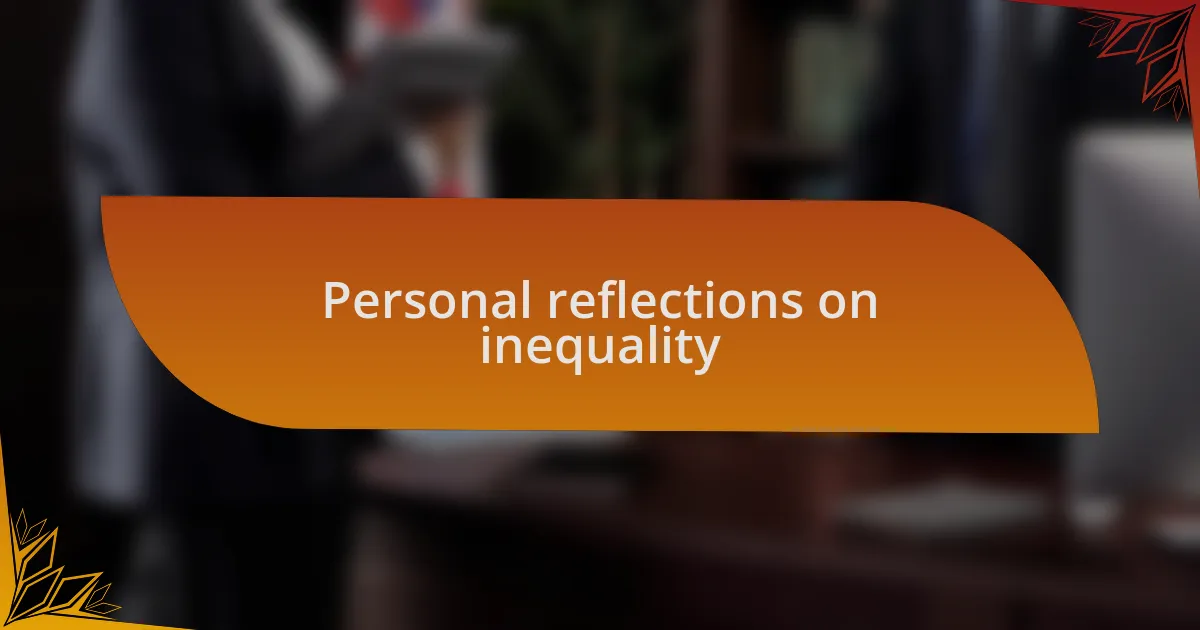
Personal reflections on inequality
Reflecting on systemic inequality, I often find myself thinking about the power dynamics that shape our daily lives. Growing up in a community where resources felt scarce, I personally experienced the ripple effects of inequality. It wasn’t just about money; it was about the opportunities that never seemed to reach my neighborhood, leaving many of us with a sense of hopelessness. Has there ever been a starker reminder of that divide than seeing the stark contrast between affluent areas and those struggling to get by?
I vividly recall a conversation with a former teacher who shared her struggles in securing funding for extracurricular activities. She was passionate about creating opportunities for us beyond academics but was met with systemic barriers. It struck me how, despite her dedication and talent, she was frequently hindered by forces beyond her control. That moment opened my eyes to how deeply entrenched inequality can stifle potential, leading us to question the fairness of a system that favors a select few over the many.
What I’ve come to understand is that acknowledging inequality is just the first step; the real challenge lies in imagining and working towards a more equitable system. As I reflect on my own experiences, I wonder how responsive our society can truly be to these challenges. Are we ready to not only listen to the stories of those affected but to actively advocate for change in policy and practice? My journey through understanding this has reinforced my belief that we all have a role to play in addressing and dismantling these inequalities.
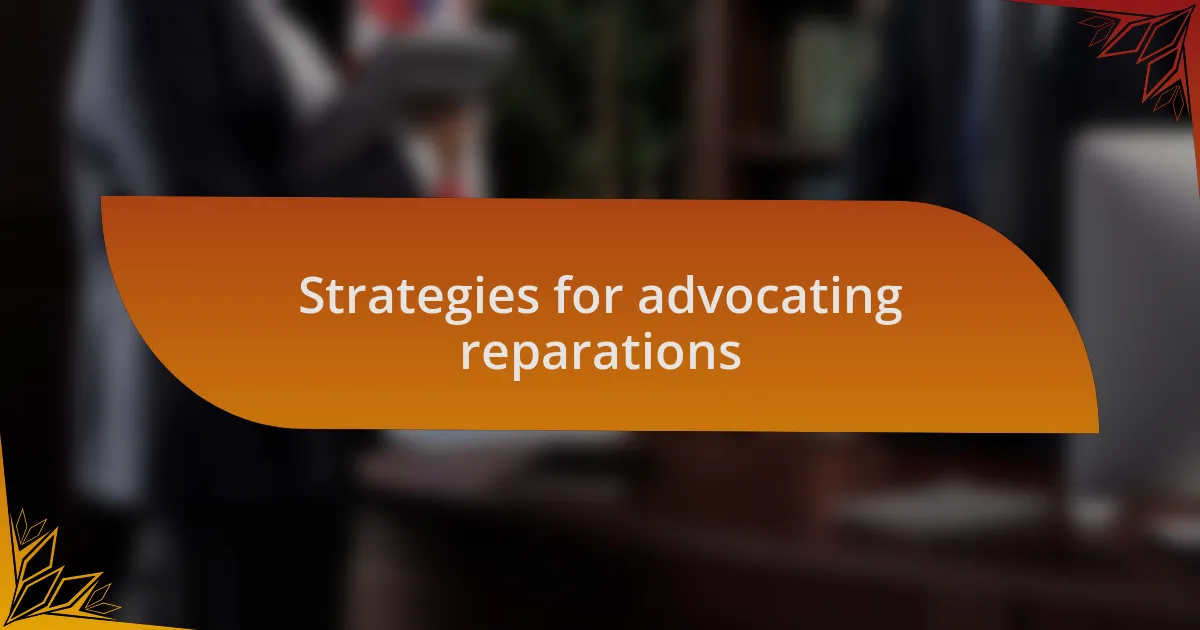
Strategies for advocating reparations
When advocating for reparations, one effective strategy is building coalitions among diverse groups. I’ve seen firsthand how uniting different communities can amplify our collective voice. It’s incredible what can happen when individuals from various backgrounds come together, sharing personal stories and experiences, as they create a stronger case for reparations. Have you ever noticed how shared narratives can create a sense of urgency in our message?
Another powerful tactic is storytelling. I recall attending a local forum where individuals shared their personal experiences with systemic inequality. The emotional weight of their stories resonated with everyone in the room, making the issue feel more tangible and urgent. This kind of storytelling can humanize the statistics, transforming abstract ideas into relatable narratives that move people to action. Why do you think personal stories hold such sway over policy decisions?
Lastly, utilizing social media as a platform for advocacy can generate widespread awareness and engagement. By sharing informative content and personal anecdotes, I’ve seen how digital campaigns can ignite conversations and inspire action. Have you ever participated in a hashtag movement? Those online efforts not only broaden the reach but also cultivate a sense of community around the cause—making it feel like we’re all in this fight together.
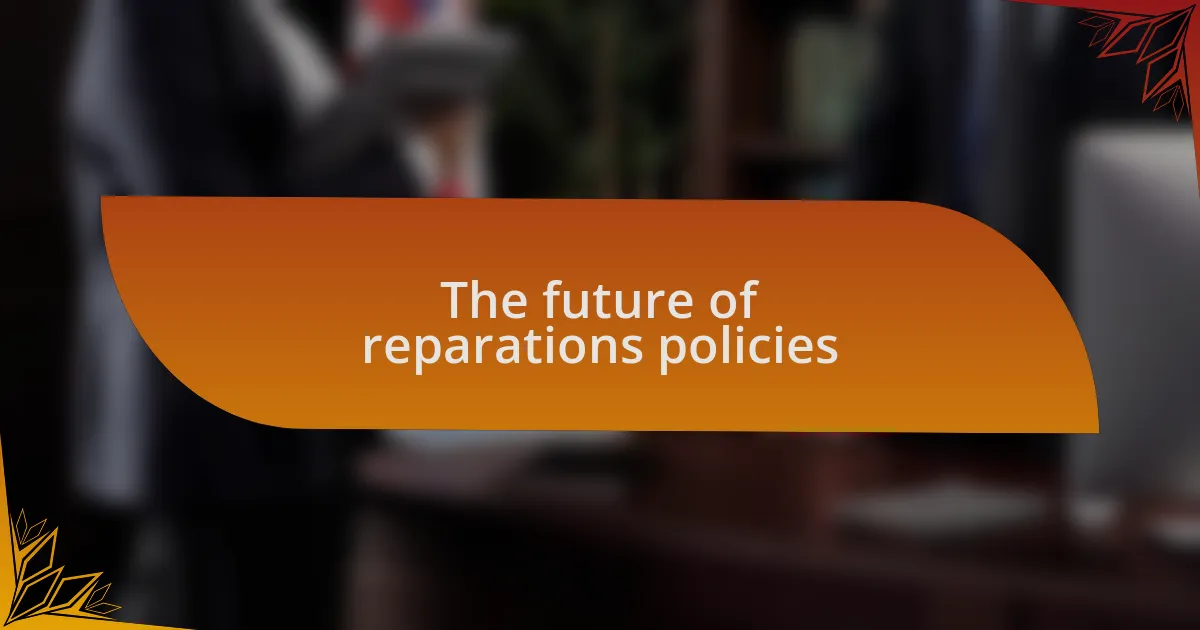
The future of reparations policies
The future of reparations policies hinges on an evolving understanding of history and its impacts. I remember a conversation with a friend who grew up in a community deeply affected by past injustices. It was eye-opening to hear her perspective on how those historical wounds shape today’s socioeconomic landscape. Could we address these legacies effectively enough to heal generational trauma?
As we look ahead, I believe inclusive dialogue will be crucial in shaping reparations policies. In my experience, when people from various backgrounds engage in open discussions, we uncover nuances that might otherwise be overlooked. Have you ever felt that a simple conversation could change your understanding of a complex issue? It can be incredibly powerful, as it fosters empathy and lays the groundwork for equitable solutions.
Additionally, the integration of technology into reparations discussions can amplify marginalized voices. I have seen initiatives using digital platforms not just for raising awareness, but for crafting policies that reflect community needs. The question of who gets to shape these narratives is vital—how can we ensure that those directly impacted have a say in their futures?